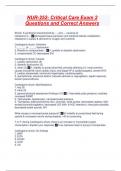NUR-252- Critical Care Exam 2
Questions and Correct Answers
Shock: A syndrome characterized by .... and ..., causing an
imbalance in... ✅decreased tissue perfusion and impaired cellular metabolism;
imbalance in supply & demand for oxygen and nutrients
Cardiogenic shock: Definition
1. ______ or _____ dysfunction
2. Results in compromised... ✅1. systolic or diastolic dysfunction
2. compromised CO (decreased SV)
Cardiogenic shock: Causes
1. systolic dysfunction (5)
2. diastolic dysfunction (3)
3. other (3) ✅1. inability to pump blood fwd, primarily affecting LV; most common
causes include MI, blunt cardiac injury, end stage HF & cardiomyopathy, severe HTN
2. cardiac tamponade, ventricular hypertrophy, cardiomyopathy
3. dysrhythmias, structural factors (valvular stenosis or regurgitation, septal ruptures),
tension pneumothorax
Cardiogenic shock: Manifestations
1. key (3)
2. early (3)
3. general physical assessment findings (10) ✅1. Narrowed pulse pressure, crackles,
increased PAWP
2. Tachycardia, hypotension, narrowed pulse pressure
3. Tachypnea, pale/cool/clammy skin, cyanosis, weak pulses, decreased capillary refill,
anxiety/confusion/agitation, decreased U/O (NA+ & H2O retention), chest pain possible,
decreased bowel sounds, N/V
What causes a narrowed pulse pressure? ✅d/t inability to pump blood fwd during
systole & increased volume during diastole; <40 is concerning
T or F: during Cardiogenic shock, there is an increase in myocardial oxygen
consumption. Explain your response ✅True, because heart is trying to compensate
Cardiogenic shock: Dx findings
1. BNP
2. ECG
3. ECHO
4. CXR
5. CK
,6. Troponin
7. BUN
8. Glucose ✅1. Elevated
2. Dysrhythmias possible
3. Left ventricular failure
4. pulmonary infiltrates
5. elevated in heart muscle damage/hypoxia, MI
6. elevated if MI
7. elevated (decreased renal perfusion)
8. Elevated; early shock d.t SNS/cortisol
Cardiogenic shock: Tx
1. Medications (4)
2. Px (3)
3. Monitoring
4. devices
5. other ✅1. Nitrates (dilate coronary arteries), vasodilators (reduce afterload), beta-
blockers (reduce HR), Diuretics (reduce preload)
2. Emergency revascularization (Angioplasty w/ stents, tPA), valve replacement, heart
transplant; tx cause
3. Hemodynamic monitoring
4. CADs
5. oxygen (NC, NR, ET)
Hypovolemic Shock: Types
1. Absolute (4)
2. Relative (5) ✅1. Actual loss out of body; Hemorrhage, GI loss (N/V/D), fistula
drainage, DI or Hyperglycemia (Polyuria/Diuresis)
2. Third spacing; bowel obstruction, burns, ascites, internal bleeding, sepsis
Hypovolemic Shock: Manifestations
1. Key (1)
2. cardiac/skin (7)
3. resp (2)
4. behavioral (3)
5. GI/GU (2) ✅1. decreased PAWP/CVP
2. decreased preload, SV, CO, tachycardia, hypotension, prolonged cap refill,
pale/cool/clammy skin
3. tachypnea to bradypnea
4. anxiety, agitation, confusion
5. absent bowel sounds, decreased U/O
Hypovolemic Shock: Dx
1. H & H
2. hourly U/O
3. RBC
,4. Lactate
5. Electrolytes
6. ABG ✅1. N or high at first, then low after fluid resuscitation
2 low; high urine specific gravity
3. N or high at first, then low after fluid resuscitation
4. elevated (hypoxia/anaerobic)
5. High Na+ (aldosterone release), low after fluids; K+ high d/t cellular release, acidosis,
AKi, progressed beyond compensatory stage; K+ low in very early shock d/t aldosterone
release
6. Early: resp. alkalosis d/t hyperventilation; Late: metabolic acidosis d/t lactate build up
(base deficit)
Hypovolemic Shock: Tx (3) ✅1. Crystalloids (NS, LR, NaCl) r/f FVE, hyperchloremic
metabolic acidosis, no LR if liver failure; hypernatremia
2. colloids (albumin, dextran) r/f FVE
3. if loss of blood is >30%, blood is given; r/f rxns
Hypovolemic Shock: Fluid resuscitation rule ✅3:1 = 3 ml of isotonic crystalloid for
every 1 ml of estimated blood loss
Neurogenic Shock:
1. causes (3)
2. may last up to
3. Results in massive... ✅1. can occur within 30 min of SCI at T5 or above, spinal
anesthetic, CNS depressant drugs (ex. opioids, benzos)
2. 6 weeks
3. massive vasodilation, leading to pooling of blood in vessels, tissue hypoperfusion,
ultimately impaired cellular metabolism
Neurogenic Shock: Manifestations
1. Key (2)
2. cardiac
3. Integument
4. Resp, GU, MS ✅1. bradycardia, Dry/cold skin
2. hypotension
3. poikilothermia (first warm & flushed)
4. Resp & bladder or bowel dysfxn, flaccid paralysis
Neurogenic Shock: Tx
1. First
2. Meds
3. T or F: bolus IVF
4. Monitor for... intervention? ✅1. spinal stability (C-collar), Oxygen
2. Vasopressors (ex. NE, dopamine, vasopressin) & atropine
3. False, used cautiously bc generally not r/t fluid loss
4. hypothermia, use foil blanket
, Anaphylactic Shock: Acute, life-threatening hypersensitivity (allergic) rxn that results in...
(3) ✅1. Release of vasoactive mediators
2. Increase capillary permeability
3. massive vasodilation (tracheal edema, 3rd spacing)
Anaphylactic Shock: Manifestations
1. key
2. behavior
3. cardiac
4. GU/GI
5. resp
6. Skin ✅1. flushed, angioedema
2. anxiety, confusion, impending doom
3. chest pain, dizzy, hypotension; circulatory failure
4. incontinence, cramping, abd pain, N/V/D
5. wheezing, stridor, bronchospasm, laryngeal edema; resp. distress
6. pruritus, urticaria; rhinitis
Anaphylactic Shock: Tx
1. meds
2. px/interventions
3. other ✅1. Epi, diphenhydramine, ranitidine; nebulized bronchodilator, aerosolized
Epi; corticosteroids
2. ET intubation, cricothyroidotomy
3. Fluids: crystalloids, colloids; oxygen
Septic shock:
1. sepsis:
2. severe sepsis
3. septic shock
4. 3 major pathophysiologic effects ✅1. systemic inflammatory response to infection
2. sepsis complicated by organ dysfunction
3. Sepsis with hypotension despite IVF, tissue hypoxia present
4. vasodilation, maldistribution of blood flow, myocardial dysfunction (Ef low initially)
Septic shock: Manifestations
1. Key (4)
2. heme (1)
3. cardiac (2)
4. resp (3)
5. GU, GI (3)
6. Mental status (3) ✅1. Increased CO, decreased SVR, warm/flushed skin to cool &
mottled (late)
2. microthrombi (decrease fibrinolysis)
3. hypotension, tachycardia




